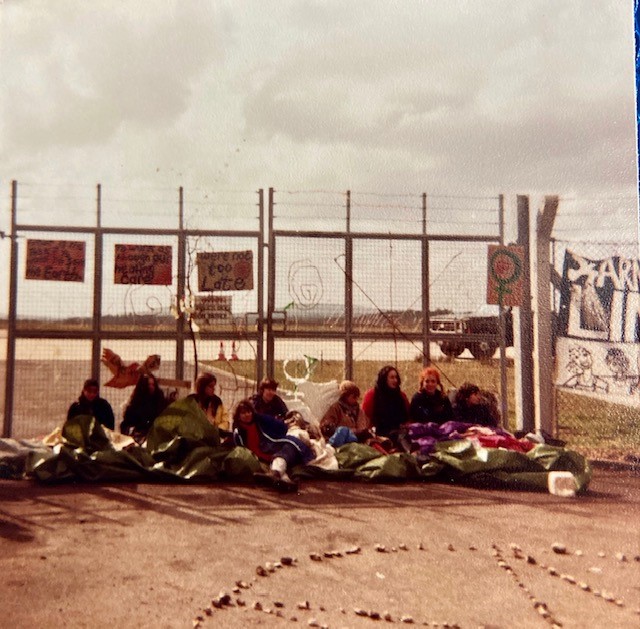A Note on the Archive
“What was important for me about Greenham was the fact that it was like the best education you’ll ever have because you do not very often in life get an opportunity to sit side-by-side with someone very different to yourself…I learnt all women are different. And that somebody’s opposing view to mine, they have just as much right to express it. And I need to hear, I need to listen. And if she’s wrong, in my view, I need to persuade her. And if I’m wrong, she needs to persuade me. She needs to enlighten me, and I need to enlighten her. That’s both our responsibilities.” Sue Say
Before you listen – a note about this archive and what to expect.
Greenham Women Everywhere (GWE) is an archive of interviews collected from people who lived at, visited, supported or experienced Greenham Common Women’s Peace Camp. In the spirit of Greenham, this archive celebrates and foregrounds the voices of women.
The first round of interviewees were self selecting as people responded to our call-out in the press and on social media. As word about the archive has grown, people have continued to put themselves forward for interview. We welcome this, though we are a tiny team and ask for patience in responding to emails and enquires.
At GWE we uphold the rights and visibility of traditionally vulnerable or marginalised groups, including those oppressed by sex, gender, disability, class, age, ethnicity, sexual orientation, marital status or religion. Although Greenham certainly was a place of rich diversity, it was not able to completely separate itself from social inequalities or address all of these, despite its efforts. We aim to recognise these inequalities and amplify the voices in our interview process which haven’t always been heard as loudly. We hope to bring even more diversity to the Greenham Women Everywhere archive moving forward and are reaching out to people we would particularly like to see represented. If there is someone you feel should be represented here please do drop us a line.
The archive documents the lived experience, ideologies and views of people who were part of Greenham, though at times these voices are at odds in this archive, as in life. The interviews in this archive cover a lot of topics and some have challenging, controversial or upsetting content that does not always align with our own views or values of inclusivity. We try to be sensitive to the fact that some interviews contain content that some listeners/readers may find offensive or disturbing. Some interviews detail male, state sanctioned and sexual violence and aggression and these maybe distressing or difficult, especially for survivors.
Where we are aware that an interview may have triggering content for listeners/readers we have done our best to flag this and place a content warning by the interview. If you feel we have missed something you would have liked us to be clearer about please do let us know and we’ll try to amend.
Note on Interviewers:
Our original interviewers were volunteers who came from a range of backgrounds, from all classes and areas of the country, from ages 19 to 70, those in work, out of work, self employed, in education and retired. Members of this team also represented different sexual orientations and those in the gender non-conforming community. We want to keep our pool of interviewers as diverse and representative as the Greenham Women themselves so if you are interested in being considered to be part of our interviewing team please get in touch telling us a little about yourself – we’d particularly welcome approaches from people of colour and gender non-conforming folk.

“Greenham was about women exploring, and expressing, and being themselves, and coming together to unite under one banner. We’re all very different women doing it a different way. What the banner was about honesty, the banner was about truthfulness, the banner was about openness. It was about warmth and caring, and working together and solidarity.” Sue Say
If you would like to considered for an interview, or to be a GWE interviewer, or have thoughts, proposals or comments on how we can make our archive more accessible or representative we’d love to hear from you. We try to be respectful, clear and kind in all our communication, and we will only respond to those who do the same.
We thank you for your understanding, look forward to hearing from you and encourage you to listen to and share the remarkable voices in this archive.
